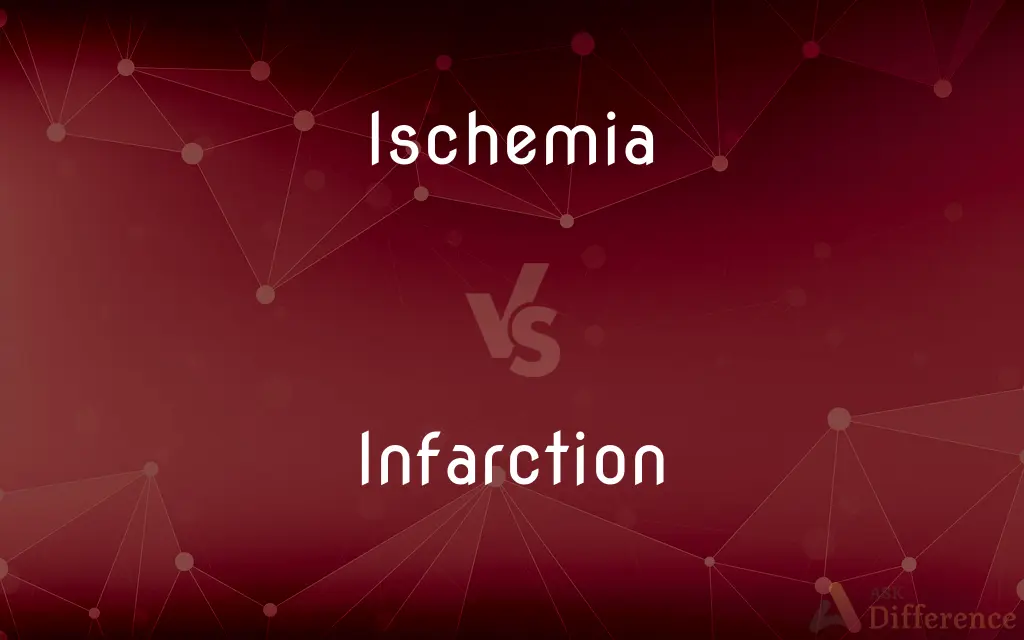Ischemia vs. Infarction — What's the Difference?
By Tayyaba Rehman — Updated on September 19, 2023
Ischemia is reduced blood flow to a tissue; Infarction is tissue death due to prolonged Ischemia.

Difference Between Ischemia and Infarction
Table of Contents
ADVERTISEMENT
Key Differences
Ischemia refers to the insufficient blood supply to a tissue or organ, often resulting from narrowed or blocked blood vessels. In contrast, Infarction occurs when this reduced blood flow leads to tissue death because the tissue is deprived of necessary oxygen and nutrients.
While both Ischemia and Infarction pertain to blood flow disruptions, Ischemia is the initial stage where there's reduced perfusion. If the Ischemia persists, it can progress to Infarction, representing irreversible damage.
Symptoms of Ischemia can vary based on the affected organ. For instance, cardiac Ischemia might cause chest pain. However, Infarction, such as a myocardial infarction (heart attack), would have more severe manifestations and could lead to lasting organ damage.
Ischemia is reversible; if the blood flow is restored promptly, the tissue can recover without permanent damage. Conversely, an Infarction indicates that tissue death has occurred and is, therefore, irreversible.
Both Ischemia and Infarction have serious medical implications. While Ischemia signals a warning, indicating the possibility of future complications, an Infarction confirms that tissue damage has already taken place, necessitating immediate medical intervention.
ADVERTISEMENT
Comparison Chart
Nature
Reduction in blood flow
Tissue death
Reversibility
Reversible with prompt intervention
Irreversible
Cause
Blocked or narrowed blood vessels
Prolonged Ischemia
Manifestation
Symptoms vary based on the organ; e.g., chest pain in cardiac Ischemia
Often severe; e.g., heart attack in myocardial infarction
Intervention Requirement
Might resolve with restored blood flow; preventive measures advised
Immediate medical attention required; specific treatments to manage damage
Compare with Definitions
Ischemia
Insufficient blood supply to a tissue.
The leg pain was due to Ischemia from blocked arteries.
Infarction
Cells dying from insufficient oxygen.
The area of Infarction was evident on the ultrasound.
Ischemia
Often from narrowed or obstructed vessels.
Peripheral Ischemia affected his limb movements.
Infarction
Permanent tissue loss from lack of oxygen.
Infarction in the kidneys can impair renal function.
Ischemia
Limited oxygen reaching the tissue.
Brain Ischemia can cause transient neurological symptoms.
Infarction
Death of tissue due to lack of blood.
The MRI revealed an Infarction in the brain.
Ischemia
Potential precursor to tissue damage.
Prompt treatment of Ischemia can prevent lasting harm.
Infarction
Outcome of sustained reduced blood flow.
The Infarction in his heart was from a prolonged blockage.
Ischemia
A consequence of vascular obstruction.
Ischemia in the heart can lead to chest discomfort.
Infarction
Ensuing damage from blocked blood vessels.
The patient suffered an Infarction in the leg.
Ischemia
Ischemia or ischaemia is a restriction in blood supply to tissues, causing a shortage of oxygen that is needed for cellular metabolism (to keep tissue alive). Ischemia is generally caused by problems with blood vessels, with resultant damage to or dysfunction of tissue i.e.
Infarction
Infarction is tissue death (necrosis) due to inadequate blood supply to the affected area. It may be caused by artery blockages, rupture, mechanical compression, or vasoconstriction.
Ischemia
A decrease in the blood supply to a bodily organ, tissue, or part caused by constriction or obstruction of the blood vessels.
Infarction
The formation or development of an infarct.
Ischemia
Local disturbance in blood circulation due to mechanical obstruction of the blood supply (for example, embolism, thrombosis, or vasoconstriction).
Infarction
An infarct.
Ischemia
Local anemia in a given body part sometimes resulting from vasoconstriction or thrombosis or embolism
Infarction
(pathology) The process which causes an infarct.
Infarction
(pathology) An infarct (an area of ischemic necrosis).[https://www.sciencedirect.com/topics/nursing-and-health-professions/infarction]
Infarction
The act of stuffing or filling;
Infarction
An infarct{2}; as, a cardiac infarction.
Infarction
Localized necrosis resulting from obstruction of the blood supply
Common Curiosities
Is an Infarction always due to Ischemia?
Yes, Infarction is the result of prolonged Ischemia leading to tissue death.
Is Ischemia always dangerous?
While not always immediately dangerous, Ischemia can lead to complications if untreated.
What are common symptoms of Infarction?
Symptoms vary based on location; e.g., chest pain for myocardial infarction.
What causes Ischemia?
Narrowed or blocked blood vessels, often from conditions like atherosclerosis, cause Ischemia.
Can Infarction be prevented?
Early detection and treatment of Ischemia can prevent progression to Infarction.
What treatments are available for Infarction?
Treatment varies based on location and cause; e.g., clot busters or surgery for a heart attack.
What is silent Ischemia?
It's Ischemia without noticeable symptoms, often detected through tests.
Can Infarctions reoccur?
Without proper management, there's a risk of subsequent Infarctions.
How quickly does Infarction occur after Ischemia?
The timeline varies based on tissue type and severity of Ischemia.
Can lifestyle changes reduce Ischemia risk?
Yes, healthy habits like a balanced diet and regular exercise can mitigate Ischemia risk.
Can Ischemia be asymptomatic?
Yes, some cases of Ischemia may not produce noticeable symptoms.
Which tests detect Ischemia?
Imaging like MRIs or angiograms, and functional tests like EKGs can detect Ischemia.
Can Ischemia lead to other complications?
Yes, prolonged Ischemia can lead to Infarction and other organ-specific complications.
Is Infarction always life-threatening?
While severe, not all Infarctions are immediately life-threatening, but they always require medical attention.
Why is early detection of Ischemia vital?
Early detection allows for interventions that can prevent progression to Infarction and other complications.
Share Your Discovery

Previous Comparison
Agronomy vs. Horticulture
Next Comparison
Hawk vs. KiteAuthor Spotlight
Written by
Tayyaba RehmanTayyaba Rehman is a distinguished writer, currently serving as a primary contributor to askdifference.com. As a researcher in semantics and etymology, Tayyaba's passion for the complexity of languages and their distinctions has found a perfect home on the platform. Tayyaba delves into the intricacies of language, distinguishing between commonly confused words and phrases, thereby providing clarity for readers worldwide.















































